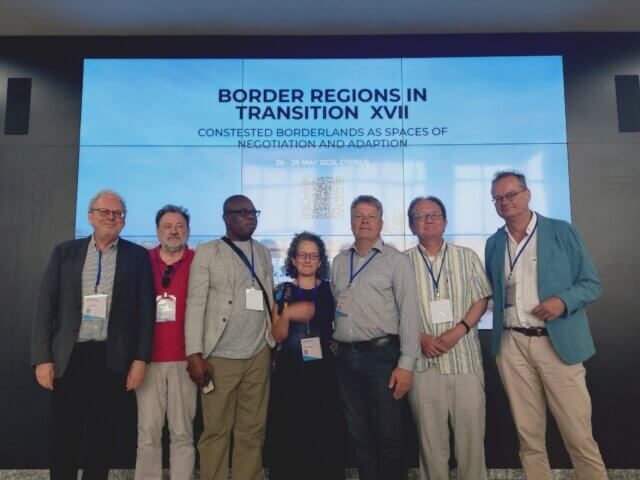
Coordinators of the BRIT Conference
Akihiro Iwashita (Nagasaki University / Hokkaido University)
From May 26 to 28, 2025, the 17th BRIT (Border Regions in Transition) Conference was held at the University of Central Lancashire in Cyprus. This was the first BRIT conference in seven years since the previous one in Africa, and it brought together scholars from around the world with a shared interest in border studies. A significant portion of the presentations focused on the former Soviet Union and Eastern Europe, especially in the context of the ongoing Russia–Ukraine war, reflecting a predominantly European-centered discussion.
The author presented findings from a public survey conducted in Nemuro, Hokkaido, which borders Russia. The presentation highlighted the concerns and hopes of residents in a border region that has increasingly taken on the characteristics of a “fortress” in the aftermath of war. Despite longstanding territorial disputes, the post–Cold War period saw cross-border interactions such as the “passport/visa-free travel” and the Kaigara Island kelp fishing under the “Russian jurisdiction,” which captured the interest of European researchers. However, these exchanges have been suspended since Russia’s invasion of Ukraine, and Japan now faces the challenge of how to rebuild them—an issue that is likely to be shared and understood in the European context as well.
Participants included leading figures such as Laurie Trautman, President of the Association for Borderlands Studies (ABS), as well as former BRIT conference coordinators from Asia, Africa and the Middle East as well as Europe.
Unlike in Asia, research on European border regions is facing increasing challenges, as these areas are shifting from “gateways” to “fortresses” amid ongoing conflict. This shift places border studies at the forefront of discussions on global risk. Nevertheless, with many young researchers and early-career scholars participating in the BRIT for the first time, there is a growing call for the development of “Border Studies 2.0” — an evolved framework capable of addressing and overcoming the chain of global crises often referred to as the “new Cold War.”
Following the conference, field trips were organized to explore the realities of the divided state of Cyprus, including Nicosia and Famagusta, exemplifying the BRIT’s distinctive commitment to on-the-ground, site-specific research.
For more on the history of BRIT conferences: https://brit.uclancyprus.ac.cy/brit-conferences/
(Akihiro Iwashita, Coordinator of the 12th BRIT Conference)



